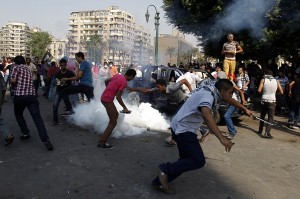
Egyptian protesters run for cover from tear gas during clashes near the U.S. embassy in Cairo, Egypt, Thursday, Sept. 13, 2012. Protesters clashed with police near the U.S. Embassy in Cairo for the third day in a row. Egypt’s Islamist President Mohammed Morsi vowed to protect foreign embassies in Cairo, where police were using tear gas to disperse protesters at the U.S. mission. AP/Khalil Hamra
WASHINGTON—The United States is working with Middle East and North African nations, particularly Tunisia and Sudan, to beef up security at its missions hit by violent protests, US officials said Friday.
The State Department has also set up a 24-hour monitoring team to pool information and coordinate its response amid an explosion of anti-US fury.
For the fourth day, crowds enraged by a film that mocks Islam protested across the Muslim world, as violence erupted in Sudan, Lebanon, Tunisia and Yemen—leaving five dead and dozens injured.
But by late Friday, all US personnel in Tunisia, Yemen and Sudan were safe and accounted for, although an American school in Tunis that was torched was now “basically unusable,” said State Department spokeswoman Victoria Nuland.
“We have now had a very strong response from Tunisian security. There is a very strong presence including members of the presidential guard, who were sent by the president to help us,” she said.
The protests first erupted on Tuesday, leading to the deaths of four American diplomatic staff, including ambassador Chris Stevens, in a militant attack on the US mission in the Libyan city of Benghazi.
There have been concerns that local security forces in some capitals failed to take strong action initially to stop protests before they spiraled out of control.
“There have been throughout this period cases where the virulence of these demonstrations and the fact that they turned violence at all has caught local security by some surprise,” Nuland said.
Under international conventions, security around the exterior of diplomatic missions around the world rests with the host nation.
“Let’s just remember that these are emerging democracies. They’re coming out of an authoritarian period where the dictator said ‘Go’ and the army went. And we’re now in a period where these countries have new relationships with forces that they depend on and we depend on,” Nuland stressed.
“So in some cases we’ve had to work hard with them to get the right response and to get it strong. But I would say in all cases, where we are now is that governments are taking this extremely seriously and are working extremely well with us.
“That’s the case in Libya, that’s the case in Tunisia, it’s the case in Egypt,” she added.
Marine teams have now been dispatched to missions in Yemen and Libya and the embassy staff in Tripoli have been reduced to emergency levels, with all the Benghazi staff evacuated out of the country.
Nuland refused to answer any questions relating to the FBI-led investigation into the deaths of the four Americans killed when the Benghazi mission came under fierce fire on Tuesday, saying “this is now a crime scene.”
The bodies of the four men were flown back to the US Friday, and welcomed home at a moving ceremony at the Andrews Air Force Base in Maryland attended by President Barack Obama and Secretary of State Hillary Clinton.
Nuland also would not be drawn on whether US diplomatic personnel from other countries would be evacuated in the coming days, or whether missions would be closed entirely.
But former US ambassador to Zimbabwe Tom McDonald told AFP: “We will see tightened security in embassies around the world and may even see some embassies closing while things sort themselves out.”
The protests broke out when Muslims emerged from mosques following the main weekly prayers to voice their anger at the film made in the United States that ridicules the Prophet Mohammed and belittles the religion he founded.
Consular teams are meanwhile working to protect American citizens in those countries hit by violence.
Since Tuesday’s anniversary of the September 11, 2001 attacks, some 66 embassies have issued 85 new messages warning American citizens traveling to those countries about the possible dangers they face.